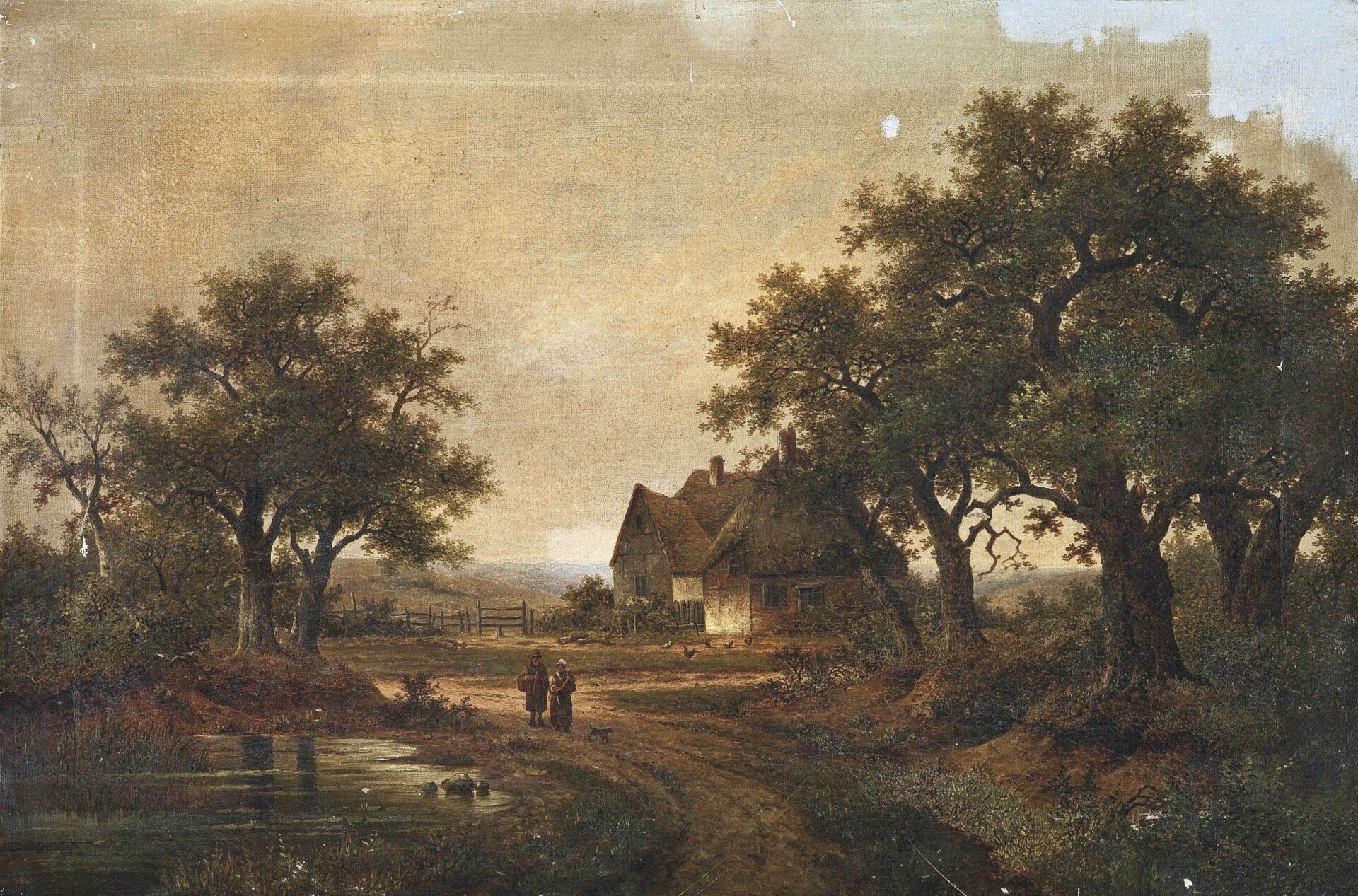Mount Rainier, MD. My dad was keen to raise kids who could work hard and who could resist nonsense. In his commencement speech to my older brother’s eighth-grade class, he impressed upon us, “Be a nonconformist.” Reject the passing trends of the world. Be skeptical of the crowd. Scorn what’s cool; seek the eternal instead.
Good advice for the Christian in any age, but perhaps especially in this one. And now that I’m older, with three children of my own, I’m not sure which piece has proven more important—being a nonconformist, or loving and knowing common, ordinary things. Both are needful. If I didn’t know the taste of common, everyday meals with my family, hikes alone in the woods, hours upon hours of sweaty back-bending work in the fields on my grandpa’s farm, and massive family celebrations (often with fresh-picked strawberries, a pig roast, and a barn dance) I don’t know if I’d have the strength to be a nonconformist.
We can’t be contrary for the sake of it (though it’s a good skill to practice, I suppose). We’re only contrary for the sake of some higher good. We only fast because there is a better feast.
In the November 2002 issue of Touchstone Magazine, Dale Nelson recounts the story of Fr. Seraphim Rose meeting up with young spiritual seekers at the St. Herman of Alaska skete, seeking a monk to be their guru in ascetic-mystic ways. The monk looked them over and saw their parched souls weren’t ready for the depths of mysticism; they needed the fare of everyday goodness. Hence, he instructed them to “watch an old Dickens film, listen to Bach, or read Dostoevsky.”
We live in a curious age: On the one hand, we feel guilty for not being into, say, opera more than we are, and on the other hand, we feel resentful that anyone should think that opera would make one’s life more complete. We’re aware of missing something, but also touchy at any suggestion that we should change—or, heaven forbid, that we have bad taste. When we’re told to sell all that we have and give it to the poor—or to disconnect from all our digital devices and pray more—we go away sad. If we’ve been teachers for any length of time, we notice students are less and less capable of receiving not only great works of art like Fauré’s Requiem into their souls, but also of appreciating common things, like compasses and folk songs. But after all, surely our taste is an indifferent matter to the state of our souls?
In Love What Lasts: How to Save Your Soul from Mediocrity (CiRCE, 2023), classical teacher Joshua Gibbs argues that good taste is, indeed, a matter of the soul. Upon brief reflection, his book has one of the most countercultural and perhaps even offensive titles possible. To offer a directive to “love what lasts” brings to mind the ubiquitous ephemerality we feel compelled to spend our time on, whether or not they deserve it: our clothes and body piercings, food and furniture, the films we watch, the books we read or don’t read, the music we listen to, the noise we fill our ears with. How much of it stays with us longer than the morning breeze?
The subtitle offers a deeper challenge, lest we be tempted to say that we are very good at loving lasting things, thank you very much. After all, do we not love our family and God, eternal souls and the Eternal One Himself? What is this mediocrity from which we must save our souls? This must be one arrogant chap.
Gibbs proposes that our taste betrays our actual creeds—what we really believe about God, despite whatever we recite on Sundays or declare on our social media profiles. After all, if our souls are meant for God, learning to love good art—that is, things that have been touched by eternity and hence have lasted for centuries and counting—prepare our souls for eternity. “Every substance is ephemeral and destructible,” Gibbs writes, “but the soul is eternal—thus, when the artist impresses his soul into a substance, the substance retains some properties of the soul. If the soul is impressed deeply enough, the substance may retain the soul’s eternality.”
Gibbs takes as an axiom that it is hard to be virtuous, just as it is hard to love good and beautiful things. It takes work: “we must tremble and struggle to want good things.” Mediocrity he defines not as something less good or harmless, but as that which actually poisons our ability to experience good things, both common and uncommon.
Gibbs distinguishes between common and uncommon things this way: Common things are like a loaf of bread, a birthday party, a backyard picnic, John Denver’s “Take Me Home, Country Roads”—they are everyday, ordinary. Uncommon things are things like the Odyssey and Paradise Lost, Bach’s fugues and Michelangelo’s David: These are out of the ordinary, things that have lasted for more than a century because there is something transcendent about them. They instruct our souls, and often leave us speechless in their presence. Holy things are uncommon: The bread and wine that become Christ’s body and blood are uncommon, holy; the bread our mother bakes is common, and so we need more of it to feed our bodies, whereas only a bite of the Eucharist sustains us.
Mediocre things are not common things, but things that trade in thrills, cleverness, shock, and sensuality such that, rather than cultivating contemplation, they sabotage it. Common things, by contrast, lead to uncommon things: they “are not at odds but are more like friends or lovers: they pour in and out of one another.” Ordinary bread, from Trader Joe’s or from the home kitchen, prepares us for the Eucharist. Ordinary birthday parties prepare us for the Christmas feast. After all, as Anthony Esolen writes in the book’s foreword, “Man cannot live on grandeur alone. He must have the ordinary, too. Every day of the year cannot be Easter, with trumpets blaring. But when the other days are full of the common, the ordinary, the home-made loaf of bread, the wild blueberries, they are as it were suffused with the reflected glory of Easter.”
Mediocre things make it hard for us to appreciate both common and uncommon things, for they are by nature ephemeral. A movie of cheap thrills but with a tacked-on moral message will communicate its cheapness far more powerfully than the easily forgettable moral, and cheapness sticks in the soul. “A mediocre song or movie asks little of us,” writes Gibbs, “and so it trains the heart to love, to grieve, or to be joyful in shallow, simple, and selfish ways.”
A common thing, on the other hand, “readies the soul and the body to receive uncommon things, which satisfy a man by uniting his body with his soul.” Mediocre things poison our taste for common things. Watermelon candy, notes Gibbs, takes away from our appreciation of real watermelon.
Gibbs recounts taking senior high school students on a trip to New York to the Metropolitan Museum of Art, the Cloisters, and the Frick Gallery. Only eleven years ago, the smartphone-less students were enthralled by the paintings they witnessed. As the years have gone by, students have found it harder and harder to sit through silent minutes gazing at the work of the old masters. What has happened? Perhaps the deluge of ubiquitous fast-paced, dazzling images and soul-deadening social media habits—and parents’ surrender to the zeitgeist—have had something to do with students’ decreasing ability to receive great art into their souls.
Parents are not helpless in this fight. I’ve taught middle-school students who are courteous, attentive, and capable of both merrymaking and contemplation, and it’s because their parents are courageous and joyful in their efforts to raise young men and women who are awake to beauty and goodness. They are willing to make sacrifices of lesser things for the sake of greater. They are willing to be nonconformists. By contrast, my husband has taught undergraduate students who are starved of wonder, focused more on grades and virtual worlds than the world in front of them, and living as de facto nihilists. They stick their neck out for nobody. The battle to awaken in such students a love of goodness and truth, students whose natural desires for knowledge and beauty have been suffocated rather than channeled and disciplined aright, is far harder.
Gibbs critiques both the worldview analyst—filled with a wretched urgency to break down and analyze mediocre films in order to be more relevant to the world and to reach the lost—and the sympathist, who is only too glad to talk and write about the “gospel hunger” in pop music and blockbuster movies, no matter how vile the content. Both the analyst and the sympathist look on the Christian who chooses to read Paradise Lost or learn Child Ballads on his guitar rather than watch the latest Marvel movie as a snob, or at the least, someone who is hopelessly out of touch.
But if our souls are eternal, why do we not then spend more time with things that habituate us to eternity? If our days are short, and the “days are evil,” as St. Paul writes, why do we spend so much time with things that are bad for our souls?
Gibbs aims to answer this question as he shows us how to cultivate better habits of love. In chapters on film, nature, beauty, social media, freedom, fakery, heirlooms, and common things, he makes the case for loving what lasts, explains how we got to where we are, and shows how we can think more clearly again and live more deliberately in the light of eternity.
He’s also an able aphorist, and his book is strewn with refreshing insight and astute zingers. Rather than a book about “redeeming culture,” he writes, this is a book “about the sort of culture that can redeem us.” He observes that Christians today “have developed both an insatiable hunger for mediocrity and a pathetic theological defense of that hunger.” He uses movies as a test case for how to go about choosing how to spend our time and how to feed our souls. From his fifteen years teaching at a classical Christian school, he observes, “Atheistic beliefs about art and beauty are so common and so deeply ingrained in the American psyche that most Christians do not know there is any alternative.” The French Revolution kicked off a never-ending war with the past—such a war has been “doomed from the start,” for we “never run out of the past. A war on the past will necessarily be endless, for no sooner has a man conquered the past than the very act of conquering becomes the past, as well.” Ironically, this war has led to increased esotericism in “high art” and sensuality in “low art”: Gibbs quips, “Jackson Pollock and Hugh Hefner both rose to prominence in the 1950s, though Pollock’s appeal was that no one understood him and Hefner’s appeal was that no one misunderstood him.”
Joshua Gibbs is a fine writer, and he writes from his experience both as a teacher and as a soul endeavoring to love things that last despite half a lifetime of consuming mediocre art. His book is an entertaining and bracing read that, I will venture to say, ought to be read by high school students, parents, teachers, classical school administrators, and Christians everywhere that feel like worldview analysis has left something crucial out of the picture. It’s for everyone who suspects that for the past several generations, most of us have been failing our children—despising them, as Charlotte Mason would say. That is, we fail to treat them as persons with eternal souls, with the capacity for virtue as well as love of truth, goodness, and beauty.
In a speech to his students before going on a field trip to visit museums, Gibbs instructs them: “You are not morally obligated to have a good time, but you are morally obligated to enrich your soul so you can be glorious mothers and fathers to your children. Do not forsake the more important things for lesser things. The love of a good time makes tourists of us all, but the search for something good and holy is the preoccupation of pilgrims, which is what you all must become.”
Gibbs makes the case for being aristocratic with our souls: If we treat our souls as if they are meant for eternity, we will not give them the equivalent of stale bread and water, or candy and Mountain Dew. Rather, we will treat our souls with a sort of kingliness, for we are all rightly sons and daughters of the King of kings, and our souls should be treated as such. This is why we are called to love what lasts rather than condemned to love whatever is in fashion. And if we commit ourselves to what is ephemeral we will pay for it: “On a cultural level, ugliness does not follow poverty so much as poverty follows ugliness: bad taste is far, far more expensive than good taste.” And when it comes to mediocre things, “balance is a myth.” When social media is concerned, for example, it does not work like cake, but “more like methamphetamine or strychnine, and there is no way of balancing out the effects of consuming such things. Poison not only attacks a man’s health, it attacks the means by which a man’s health is renewed.”
We say we want to be free, but Gibbs says, “we only want to want to be free.” Rather, “A man is only as free as his love of good things.” But most of the time we prefer prison. It’s hard, after all, to opt out of what Roger Scruton called “the cult of ugliness.” Beauty can make us uncomfortable, after all, for, “We should not expect beauty to cater to us. We should be prepared to bow down.”
If we’re not teaching our students, and ourselves, to love what lasts, then why waste our time? Common things prepare us for the uncommon, the holy. If we give our time and our souls to mediocre, soul-deadening things, then even what we have will be taken away from us.
I found myself thinking of my dad often while reading Gibbs’s book, grateful that he gave my brothers and me a grounding in common things, as well as a suspicion of whatever the going trend was. My dad was gloriously unperturbed with the latest handwringing; he promised no titillating reaction to any juicy sins we may have been tempted by. He also intentionally sought out beauty as well as truth and goodness in the churches we attended. We didn’t feel burdened by the need to laud every banal technological “advancement” or blip on the theater menu, nor did we feel the need to baptize every worldly trend. We did feel burdened to honor our family, and above all God, by doing good work, making beautiful things, being honest to a fault, and not wasting our time.
But it’s never too late to begin to learn to love better: “The responsibility to love and enjoy beautiful things is a lifelong task which is not abrogated simply because we start late,” Gibbs writes. We can begin now. What have we to lose, other than ephemerality itself?
Image credit: “Peasants Walking Along a Country Lane” by Hendrik Pieter Koekkoek






1 comment
Martin
Very inspiring essay. I liked the quote about Pollock and Hefner.
Comments are closed.